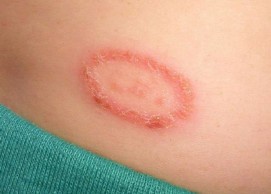What is the treatment?
Ringworm infection or dermatophytosis is a fungal infection occurring in the skin. This infection can affect both animals as well as humans. It initially spreads with red patches in the affected area of the body and later starts spreading to other parts as well. This infection affects the skin on the beard, groin, scalp and other parts of the body. There are a lot of symptoms of ringworm such as scaly, red and itchy patches, patches which develop into blisters and later start to ooze, patches which are redder on the outside, usually resembling a ring and patches with defined or raised edges. Ringworm infection can also be experienced by some people on their nails. The symptom of this infection on the nails is characterized by the nails becoming discolored, thicker and starting to crack. If your scalp is affected, then the hair on the infected portion may start to fall off and you will have bald patches.
Three types of fungi called epidermophyton, microsporum and trichophyton is responsible for causing ringworm infection. These fungi live and thrive on soil as spores, it is possible that human or animals can contract this infection by coming in contact with the soil. Ringworm infection spreads quickly with contact and it is common in children by sharing items which might not be clean. Many people try to self treat this infection by avoiding clothing which irritates the infected area, covering the infection with a bandage, disinfecting clothes and bedding and cleaning their skin on a regular basis. Sometimes, these remedies don’t help to cure this infection, in such cases doctors can prescribe medicines such as antifungal creams or ointments.
How is the treatment done?
If you experience symptoms of a ringworm infection, it is vital to consult a doctor as soon as possible. You will be asked to go through certain tests such as a fungal culture or skin biopsy test. In this test, the doctor extracts discharge from the blister and sends it for biopsy. You can also go through a KOH exam where the doctor will scrape off a tiny area of infected skin and put it inside potassium hydroxide (KOH). Then your skin tissue will be observed under a microscope. The doctor can also see your skin under a black light to see the traces of fungus on your skin. After the diagnosis is complete and it is proven that you have a ringworm infection, topical medicines like sprays, gels and antifungal ointment are prescribed. However, ringworm occurring on the nails and scalp may require a much powerful medicine like terbinafine, griseofulvin and ketoconazole.
Antifungal creams like miconazole and clotrimazole are very effective in treating ringworm infection. During your treatment it is vital not to scratch the infected area over and over again, as this might make you more susceptible in developing strep or staph infection. If at all, you get this infection along with the ringworm infection, your doctor can prescribe you powerful antibiotics to treat it completely.
Who is eligible for the treatment? (When is the treatment done?)
Since this infection is common in children who own pet dogs and cats because these animals can easily catch the infection and pass it on to their owners. Therefore, these children should go for health check-ups at least once in three months. People using a public pool or public shower area are also at a high risk of getting this infection, hence they are eligible for an anti fungal treatment.
Who is not eligible for the treatment?
If you have any allergies or medical conditions, you should take a doctor’s opinion before using anti fungal medicines as it may interfere with your existing medical condition. People who are already undergoing treatment for some other medical ailment should also consult their doctor before starting this treatment.
Are there any side effects?
Antifungal medicines can have a lot of side effects like indigestion, feeling sick, fatigue, diarrhea and irritation to the skin. In rare cases, liver damage can also occur.
What are the post-treatment guidelines?
After you get treated from ringworm with the help of anti fungal medicines, it is important to maintain hygiene and take good care of your health so that the infection doesn’t reoccur. It is vital to wash your hands after touching or interacting with animals, also try to disinfect your pets as much as possible, avoid physical contact with animals or people who have a ringworm infection, use shampoos and take a shower regularly, wear protective shoes while going out and keep your body clean and dry at all times. You should also avoid sharing items like hairbrushes and clothes with people who already have a ringworm infection.
How long does it take to recover?
Anti fungal ointments can heal the ringworm infection in about two to four weeks. If it is used regularly and more than once a day, the infection can heal sooner. If the symptoms are taking more than four weeks to disappear then your doctor may prescribe you antibiotics along with your anti fungal medicines. Majority of the patients suffering from a ringworm infection, respond positively to anti fungal medications.
Are the results of the treatment permanent?
The results of this treatment are permanent to some extent. However, it doesn’t prevent you from getting the infection later in life if you don’t maintain personal hygiene.
What are the alternatives to the treatment?
Apart from anti fungal creams, ringworm infection can be treated with the use of topical medications, antibiotics, strong oral medications, etc. However, oral medication is given for a 3 months course.



